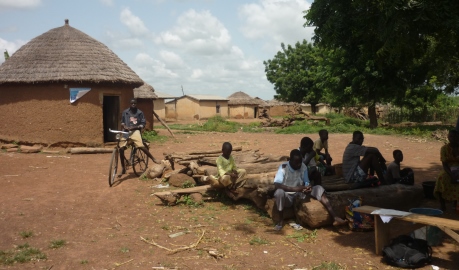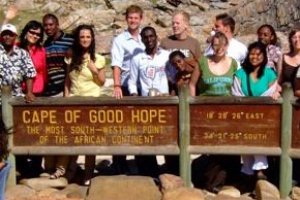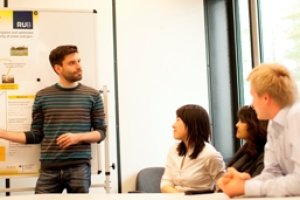Entwicklungsforschung / IEE
About us
The Chair for Development Research focuses in research and teaching on the causes of growth in developing countries and emerging countries. In addition, the chair works theoretically and empirically on welfare-economics-based procedures for evaluating development programmes and projects. Finally, the Chair for Development Research is responsible for the scientific and administrative management of the Institute of Development Research and Development Policy (IEE) and the international cooperation projects based there, as well as for teaching in the IEE's Master's programme and PhD programme.

Team
Teaching
Information on:
Bachelor’s thesis
- If you are interested in writing your Bachelor’s thesis in the field of development economics, please send an email with your inquiry, research topics you are interested in and a current transcript of records to wilhelm.loewenstein@rub.de Please do that at least 4 months prior your start with your Bachelor’s thesis.
- There is one starting date for Bachelor’s theses per semester. During the winter term it is regularly in October, during the summer term it is in April. The specific starting date and the period of revision can be found here.
- The requirements for thesis supervision are the following:
– Successful completion of the module “Principles of Development Economics”.
– Free capacities for thesis supervision at the Chair for Development Research.
Besides these specific requirements, please consider the general requirements according to the examination regulations.
Master’s thesis
- The starting date for master’s theses is set by everyone individually in consultation with the Chair for Development Research.
- Please inquire for theses supervision with the Chair for Development Research 4 months in advance. To do so, please send an email to wilhelm.loewenstein@rub.de including a current transcript of records and suggestions for research topics in the field of development economics on which you would like to write your Master’s thesis.
- The requirements for thesis supervision are the following:
– Successful completion of at least one of the two modules “Growth and Development Economics” and “Cost-Benefit Analysis”.
– Free capacities for thesis supervision at the Chair for Development Research.
Besides these specific requirements, please consider the general requirements according to the examination regulations
If you need recognition of academic performances which have a focus on development economics completed at a foreign university, please consider the following instructions before and after your stay abroad:
Before departure
To make sure that the courses you plan to take abroad can be recognized after your return, please provide us with the following information about these courses before your stay abroad:
- A module description;
- Number of ECTS-points;
- Number of contact hours per week;
- Information about the examination modalities;
- Information about the literature used in the courses;
- Name and level of study (Bachelor/Master) the course you will take has at your host university.
If this information is not available in either German or English, we need a certified translation. Please note that Bachelor’s courses cannot be recognized for Master students.
After your return
To complete the recognition process, please provide us with the following documents:
- The form for credit transfer provided by the Examination Office, filled out with all the necessary information.
- Official transcript of your host university that indicates the grade and ECTS of the module that you want to have recognized.
Contact person regarding the recognitions of academic performances completed abroad is wilhelm.loewenstein@rub.de
Lecture:
The lecture will take place in-person in HZO 40, 12-14h, from Monday, 10 October 2022, onwards.
The maximum number of course participants is set to 30. Enrollment (full name and matriculation number) takes place via email (ieeadmin@ruhr-uni-bochum.de) in the period 19.09.22-28.09.22. Students will be selected randomly in case we have more than 30 applicants. The selection result will be communicated via email on 30.09.22 until noon. This email will further contain information on the access code for self-inscription in moodle.
Mondays, 16-18h Uni-Str. 105, EG 0/14 Start: 10.10.2022
This course will not be offered in the winter semester 2022/23.
This course will not be offered in the winter semester 2022/23.

Since mid-2000, the Institute of Development Research and Development Policy has been offering an international English-language Master’s program in Development Management at the Ruhr University Bochum. Since May 2002, the program has also been offered at the University of the Western Cape, South Africa; originally as part of the DAAD initiative “German Programmes of Study Abroad” and now as part of the DAAD-funded “South African – German Centre for Development Research”. The duration of each program cycle is three semesters (18 months). Each year, up to 25 students are accepted in Bochum and up to 20 students in Cape Town.

Since 2007, the IEE offers the 3-year structured, English-language, interdisciplinary and international PhD program “International Development Studies” (PhD IDS). Integral components of this program are a doctoral curriculum and a field research period. The Faculty of Geosciences, the Faculty of Law, the Faculty of Social Sciences and the Faculty of Economics of the RUB are involved.
The duration of each program cycle is three years, including a research stay of up to six months. Participants can choose from a variety of tailored teaching modules while working on their own research projects. Each research project is assigned a supervisor. All supervisors of the PhD students hold a professorship at the participating faculties. PhD students are offered the opportunity to present and discuss their individual research projects on a regular basis at meetings of the IEE’s three research clusters, which are attended by all PhD students as well as supervisors and other IEE staff.
Candidates with an above-average university degree in law, social or political sciences, economics, development management or related subjects from all over the world, who wish to further their academic qualification through a research project in the field of “International Development Studies” and become a member of an international and interdisciplinary research group, are invited to apply for a place in our PhD program.
Teaching offers
Research
Research projects
Publications
Prices of Fairtrade Wine. with robin Back, Karl Storchmann and Nick Vink. Forthcoming in Journal of Wine Economics, 16(2).
Pricing Models for German Wine: Hedonic Regression vs. Machine Learning. Forthcoming in Journal of Wine Economics, 16.
(2021) with Wolfram Rinke: Pricing Models for German Wine: Hedonic Regression vs. Machine Learning. Forthcoming in Journal of Wine Economics, 16.
Prices of Fairtrade Wine. with robin Back, Karl Storchmann and Nick Vink. Forthcoming in Journal of Wine Economics, 16(2).
Pricing Models for German Wine: Hedonic Regression vs. Machine Learning. Forthcoming in Journal of Wine Economics, 16.
(2021) with Wolfram Rinke: Pricing Models for German Wine: Hedonic Regression vs. Machine Learning. Forthcoming in Journal of Wine Economics, 16.
Institute of Development Research and Development Policy
Ruhr University Bochum
Room 2.04
Universitaetsstr. 105
D-44789 Bochum
Phone:
The chair belongs to the competence field:



